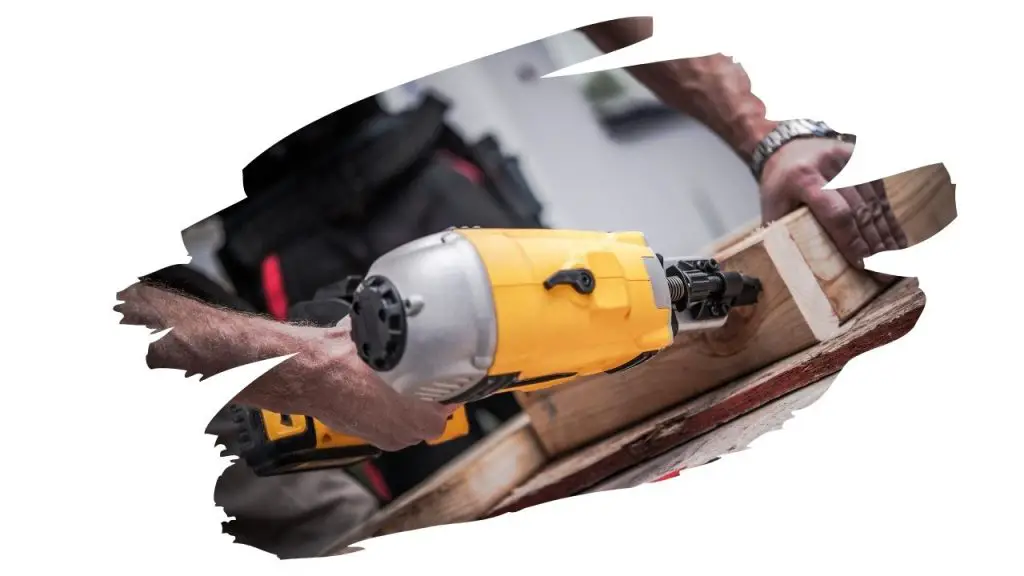Many carpenters use nailers to fasten nails into furniture. And having one of these powered tools makes it quicker and easier for any woodworker to puncture lengthy nails into softwood fixtures or hardwood boards.
What type of nailer should you use with plywood?
You can use a 15 gauge or a 16 gauge nailer on plywood, but the type of nailer you use will depend on three things:
- 1). What are you nailing?
- 2). How thin is the plywood you’re nailing?
- 3). What type of nails are you using?
These are just a few important things to consider when deciding whether or not you should use a nailer on your plywood project.
So let’s take a deeper look so that you can work out for yourself whether or not using a nailer on plywood is right for you…

This post may contain affiliate links to products that we receive a commission for (at no additional cost to you). Learn more here.
Can You Put Nails In Plywood?
Plywood is a manufactured wood that is used for structuring projects such as stairs, doors, cabinets and even flooring.
Now, because of its frequent use in supportive structures, plywood needs to be secured firmly in place. So we use nails (more often than say screws or glue) to hold plywood in place.
This isn’t without its own problems. While using screws on plywood can risk splitting the wood, nails can also potentially force the plywood veneers apart.
What Kind Of Nails Do You Use For Plywood?
Whether you are using plywood on an exterior or interior structure, you are likely best off using ‘Framing Nails’ on this particular type of wood.
A framing nail, (which is sometimes referred to as a Sinker Nail), typically has a thin coating of vinyl.
This vinyl lubricant coating makes it easier to push the nail through wood. And the waffle head shape of this type of nail makes it easier to punch these into the plywood as well.
What Size Nails Do I Use For Plywood?
Deciding which size nail to use boils down to what you are nailing.
For instance, the three most common nail sizes used by carpenters is the 8d Finish Nail, 10d Sinkers, and 16d Common Nails.
The ‘d’ is shorthand for ‘penny’, making these three sizes; 8-penny, 10-penny, and 16-penny nails.
Why are nails measured in penny’s? Its a Roman thing. Literally! The ‘d’ in 8d/10d/16d is the symbol for the Roman ‘denarius’ coin. When Rome invaded England, the denarius became common currency until it was replaced with the English ‘penny’. Each nail length was named after the amount of pennies it would cost to purchase them. So a 16d nail cost 16 pennies. A 10d nail cost 10 pennies, and so on. Or at least that is how the legend goes.
An 8d nail is 2-1/2 inches long. A 10d nail is 3 inches long. And a 16d nail is 3-1/2 inches long.
When using nails to fasten plywood structures, then an 8d nail is plenty long enough to get the job done.
The only time you would consider using a longer (or shorter) nail is if the plywood is especially thick or thin.
But for the most commonly sold plywood thickness, (which is a 1/2 inch sheet of 4×8), an 8d nail will suffice.
What Is The Best Nailer For Plywood Sheathing?
If you want to nail plywood sheathing, then you are going to need a heavy duty nailer. In this case, you should look into getting a ‘Framing Nailer’.
This particular type of nailer can nail long nails, up to 16d common nails.
They are quite versatile too, and can be used on wood siding, decking, fencing and more.
One of the best framing nailers on the market is the surprisingly lightweight Bostitch Framing Nailer (the Round Head, 1-1/2-Inch to 3-1/2-Inch version).
Check out the latest prices for the Bostitch Framing Nailer over on Amazon.
Which Nailer Should I Use On 3/4 Plywood?
Usually, plywood is purchased at a 1/2 inch thickness. But sometimes a woodworking project might call for a thicker or even thinner plywood panel.
As a general rule of thumb, thin plywood requires shorter nails. However, where it relates to 3/4 plywood, an 8d nail should still be perfectly fine to use in this instance. But in some cases, you may need to use nails that are as short as 6d in length (approximately 2 inches long).
Also, a short nail needs a specific nailer designed for small finish nails. In other words, you need to look into getting a ‘Brad’ Nailer for this job.
This electric-powered tool is great when used on small and precise nailing jobs.
Now, if you want a brad nailer, (but you don’t want to buy endless high-priced gas cartridge refills), then you won’t go too far wrong by grabbing the Porter Cable 20V Max Cordless Brad Nailer.
It is battery powered, which means that it does not use a compressor hose or require gas cartridges. And yet it still nails through hardwood or softwood timber with ease.
Check out the latest prices for the Porter Cable 20V Max Cordless Brad Nailer over on Amazon.
Some Final Thoughts
To sum up, using a Brad or Framing nailer on plywood is pretty straightforward, once you know what to look for.
The type of nailer you use for plywood comes down to the thickness of the ply you are working with.
If you are not sure what thickness plywood you will be using, then a 15 or 16 gauge nailer can be used reliably on most plywood boards.
References
https://en.wikipedia.org/wiki/Penny_(British_pre-decimal_coin)





